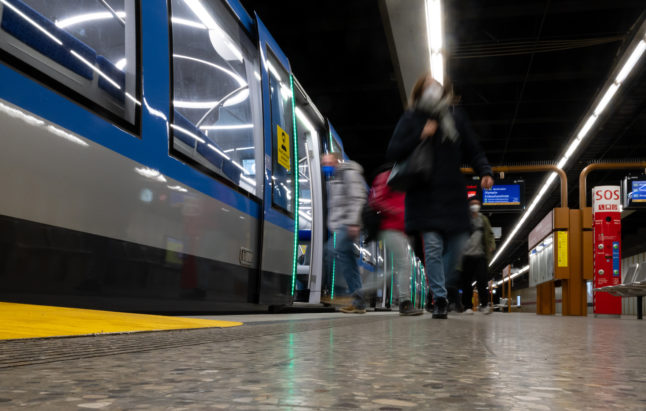What’s all this about?
The traffic light coalition has put together a massive relief package to support residents struggling with high fuel costs. The plans include a €300 one-off payment to taxpayer, fuel tax cut and a cheaper travel ticket offer.
READ MORE: What Germany’s energy relief package means for you
Why cheaper public transport?
The €9 monthly travel ticket is aimed at encouraging people to ditch their cars and use public transport, protecting the environment in the process.
“In the current situation especially, public transport is for many citizens a necessary, efficient and cost-effective alternative to their own cars and at the same time the most environmentally friendly means of transport next to the bicycle,” writes the coalition in its resolution paper on the relief package.
“That is why we are introducing a ticket for €9/month (“9 for 90″) for 90 days, and will increase regionalisation funds so that the states can organise this.”
The ticket will be valid for three months and cost a total of €9 per month or €27 in total.
Following a meeting with state transport ministers on Friday, Transport Minister Volker Wissing said that the government wanted to use the ticket as an incentive to switch to public transport and to save energy.
He put the loss of revenue for transport companies at €10 billion and said it would be covered by the federal government, including possible additional costs.
Who can buy the €9 ticket?
Anyone and everyone will be able to get it, it won’t be aimed at a particular group of people.
What if I already have an annual or monthly subscription (known as an Abo)?
This is on the minds of a lot of people. Berlin’s public transport provider BVG alone has almost 290,000 subscribers who pay a monthly or yearly fee for a ticket.
An annual pass for Berlin and the surrounding area, for example, costs €978 – which translates to about €81 a month. If monthly tickets were also available for 90 days for €9, transport bosses say it is clear how many regular customers would react.
“They would cancel – with huge consequences for the transport companies,” one company said, according to the Berliner Zeitung.
For this reason, the advice to these valuable customers from the likes of BVG, S-Bahn Berlin (and other transport providers across Germany) is to sit tight.
“We would like to ask all customers not to cancel their subscriptions, but to wait for our active communication,” the Berlin-Brandenburg VBB transport operator said on Thursday.
BVG is now discussing measures, such as giving subscription customers three months of free travel. A special ticket is also being discussed that regular customers can purchase as soon as the validity of their current ticket ends.
However, the German government is also set to address this issue.
According to Federal Transport Minister Wissing, the planned cheaper tickets will also apply to people who have subscriptions.
He said there was no reason to cancel a subscription ticket because of this new offer. Subscription customers would have to be reimbursed the difference to the price of their tickets.
But Wissing did not give concrete details of how it would work in practice.
Where will the public transport ticket from the relief package be available?
The decision paper does not specify any restrictions – so it can be assumed that the ticket will be valid for all regional and local public transport.
When will the special ticket be available?
We don’t know about this either. It will depend on how fast the package can be pushed through, how quickly the government pumps the money to federal states and how long they then need to implement the ticket.
There is some speculation. According to DPA sources, the start date could be May 1st or June 1st this year.
The day after the announcement of the new “9 for 90” ticket, the ‘traffic light’ coalition parties (SPD, Greens and FDP) said there was still a need to clarify and get the small print together. Various regional transport companies also said they had been given no advance information from the government on this move.
However Transport Minister Wissing said he thought the low-priced ticket could be implemented relatively quickly if online tickets were offered.
What’s the reaction?
It’s mixed. The passenger association Pro Bahn slammed the planned ticket.
“In our view, ‘9 for 90’ is a populist quick fix with no lasting effect,” Karl-Peter Naumann, spokesman for Pro Bahn, told the Redaktionsnetzwerk Deutschland (RND).
Pro Bahn said it would make more sense to invest the money in the expansion of public transport. They also said there were still too many unanswered questions about the practical implementation.
Some people have also raised that this measure is aimed at people in towns and cities, and won’t benefit communities with far fewer transport links.
Others, including state have said suggested that the government could make transport free rather than €9 per month.
Economist Veronika Grimm welcomed the plans.
“I think it is right to relieve people with low incomes, those who need it most too,” she said.
“Making public transport cheaper is also the right thing to do.”



 Please whitelist us to continue reading.
Please whitelist us to continue reading.
Member comments